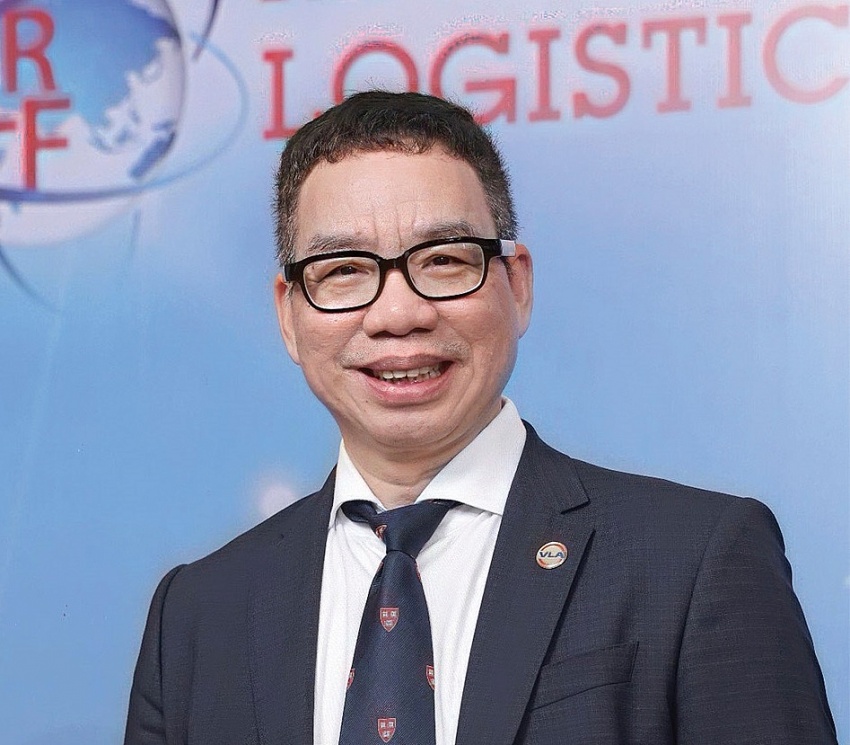Pros and cons must be tackled in logistics industry
How have tariff barriers affected logistics businesses’ operations amid growing trade protection?
 |
| Dao Trong Khoa, president of the Vietnam Logistics Business Association |
In 2024, tariff barriers continued to have major impacts on the operations of logistics businesses, and in Vietnam in particular. Trade protection measures from some major markets such as the US, the EU, and China have caused many fluctuations in the global supply chain. For the logistics industry, these changes affected transportation costs, customs clearance time and business competitiveness.
Specifically, the application of anti-dumping duties, safeguard duties or stricter regulations on origin by some countries made the demand for logistics services more complicated, requiring businesses to adapt quickly. Compliance costs increase, while changes in the flow of goods can disrupt transportation and warehousing plans.
However, with the development and effective implementation of free trade agreements (FTAs), many of Vietnam’s key export items still have significant tariff advantages, creating opportunities for market expansion. In this context, logistics businesses can take advantage of this to provide specialised services.
What are the gains and challenges that FTAs bring to the Vietnamese logistics industry in regards to the impact of tariff barriers, and what steps have local logistics service providers been taking?
FTAs promote imports and exports and this playing field is fair for both sides, so Vietnamese logistics enterprises need to grow quickly and reach out. As for minimising the impact of tariffs, it is necessary to diversify the market, avoiding dependence on one market.
It is also necessary to improve the competitiveness of goods. Instead of worrying about things beyond our control, such as tax policies of countries, we need to focus on increasing internal strength.
FTAs bring many important benefits to Vietnam’s logistics industry: they help reduce or eliminate tariffs on exported goods, boosting demands for transportation, warehousing, and freight forwarding. Moreover, commitments on customs, origin of goods, and technical standards help encourage transparency and enhance the capacity of logistics businesses.
Domestic logistics enterprises also have opportunities to cooperate with international ones, learn from experience, and upgrade tech.
However, there are also challenges. As the market opens up, more foreign logistics companies with large capital, advanced technology and extensive experience will participate more deeply in the Vietnamese market. They have to meet higher compliance requirements. FTAs set stricter standards on origin, environmental protection, labour, and others, which increase compliance costs.
Vietnamese logistics enterprises are taking many preparation steps. They have been making technology investment, and applying AI and blockchain in supply chain management and transportation to optimise operations. They have also beem standardising processes and improving worker capacity.
What are the possible future impacts of tariff barriers on Vietnam’s logistics industry amid new announcements from various countries?
If US and European tariff policies continue to target Chinese goods, there will be changing trade flows. Vietnam could be among the destinations in the trend of shifting supply chains. However, it should also be noted that these changes may lead to pressure from trade defence measures targeting goods originating from Vietnam.
Tariff measures can lead to disruptions in supply chains, increasing transportation, storage, and delivery costs. In addition, stricter requirements on origin and environmental standards such as the EU’s Carbon Border Adjustment Mechanism will also pose challenges for logistics businesses, requiring them to have a strategy to green services.
Global businesses will diversify their supply sources, instead of depending on a single market. Vietnam may become a more important link in the regional supply chain, but will also face fierce competition from other countries in the region.
In 2025, tariff barriers are likely to continue to be an important factor affecting the logistics industry, with several key trends. Firstly, imposing anti-dumping taxes, safeguarding taxes, and technical barriers may continue to increase, requiring logistics businesses to flexibly adjust their operating strategies.
Second is supply chain shifts. Many multinational corporations are restructuring their supply chains to reduce their dependence on certain traditional markets. Vietnam can benefit from this, but it also faces changes in transportation and warehousing models.
To prepare for the new development phase, Vietnamese logistics enterprises need to invest in technology and optimise operations to improve efficiency and reduce costs, while increasing the ability to adapt to fluctuations from tariff policies.
Meeting international requirements on origin and environmental regulations will also be important factors for Vietnamese goods to maintain and expand the market.
Increasing the application of AI, blockchain, and others in supply chain management will meanwhile help logistics businesses improve transparency, operational efficiency, and competitiveness in the international market.
Although tariff barriers may pose challenges, they also open up opportunities for the Vietnamese logistics industry to enhance its position in the global supply chain.
 | Vietnam’s logistics landscape has scope for growth Vietnam’s logistics infrastructure remains a major barrier to seamless trade. Despite ongoing investments, limited road networks, outdated ports, and underutilised rail and inland waterways continue to hinder the efficient movement of goods. This results in congestion, delays, and elevated logistics costs, reducing Vietnam’s competitiveness in the global supply chain. |
 | Free trade zone impacts and future solutions for logistics A free trade zone (FTZ) is an economic area where goods can be imported, stored, processed, and re-exported without being subject to import duties or other non-tariff barriers. FTZs play an important role in promoting international trade, especially the logistics industry – a sector that plays a core role in connecting the global supply chain. |
What the stars mean:
★ Poor ★ ★ Promising ★★★ Good ★★★★ Very good ★★★★★ Exceptional
Related Contents
Latest News
More News
- Citi economists project robust Vietnam economic growth in 2026 (February 14, 2026 | 18:00)
- Sustaining high growth must be balanced in stable manner (February 14, 2026 | 09:00)
- From 5G to 6G: how AI is shaping Vietnam’s path to digital leadership (February 13, 2026 | 10:59)
- Cooperation must align with Vietnam’s long-term ambitions (February 13, 2026 | 09:00)
- Need-to-know aspects ahead of AI law (February 13, 2026 | 08:00)
- Legalities to early operations for Vietnam’s IFC (February 11, 2026 | 12:17)
- Foreign-language trademarks gain traction in Vietnam (February 06, 2026 | 09:26)
- Offshore structuring and the Singapore holding route (February 02, 2026 | 10:39)
- Vietnam enters new development era: Russian scholar (January 25, 2026 | 10:08)
- 14th National Party Congress marks new era, expands Vietnam’s global role: Australian scholar (January 25, 2026 | 09:54)

 Tag:
Tag:



















 Mobile Version
Mobile Version